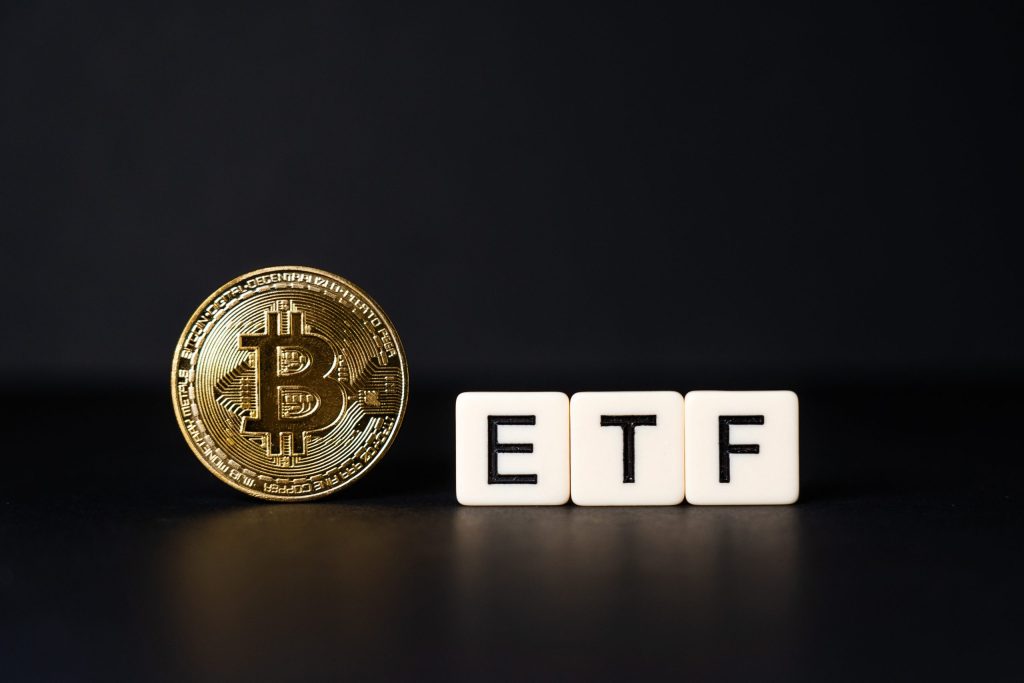In a significant development for cryptocurrency enthusiasts, the Securities and Exchange Commission (SEC) has granted approval for multiple exchange-traded funds (ETFs) designed to provide a straightforward avenue for traders to invest in Bitcoin. Today, let’s find out with Coincu which are the best Bitcoin ETFs to invest in 2024.

What is a Bitcoin ETF?
The Bitcoin ETF is a game-changer for investors seeking exposure to the value of Bitcoin within the traditional financial market landscape. Unlike conventional cryptocurrency exchanges, these ETFs trade on established market exchanges, offering a convenient avenue for investors to engage with Bitcoin without the complexities associated with digital asset platforms.
In essence, a Bitcoin ETF functions as a financial instrument that mirrors the value of Bitcoin, providing investors with a regulated and accessible means to participate in the cryptocurrency market. This innovation eliminates the need for investors to navigate the often intricate processes of cryptocurrency exchanges, streamlining the investment experience and making it more user-friendly.

One of the key advantages of Bitcoin ETFs lies in their ability to offer leverage on the price of Bitcoin. This feature allows investors to amplify their exposure to the cryptocurrency’s price movements without the need to directly hold or manage the digital asset.
By trading on traditional market exchanges, these ETFs bring an element of familiarity and ease to the investment process, potentially attracting a broader range of market participants.
Read more: Bitcoin Spot ETF Explained: All Things You Need To Know!
How do Bitcoin ETFs Work?
Functioning similarly to traditional ETFs, a Bitcoin ETF would mirror the fluctuations in the price of Bitcoin. In essence, the value of one share of the exchange-traded fund would correlate directly with the market value of Bitcoin. If the price of Bitcoin rises, the ETF’s value follows suit, and conversely, a decrease in Bitcoin’s value would be reflected in the ETF.
What sets a Bitcoin ETF apart is its trading platform. Unlike traditional cryptocurrencies that trade on specialized cryptocurrency exchanges, a Bitcoin ETF would find its home on well-established market exchanges such as the New York Stock Exchange (NYSE) or the Toronto Stock Exchange (TSX). [read more]
The introduction of a Bitcoin ETF could potentially bridge the gap between the traditional financial sector and the ever-evolving cryptocurrency market. Investors, both institutional and retail, may find this new investment avenue attractive due to the familiarity and regulation associated with conventional exchanges. [/read]
What Are the Differences Between Bitcoin ETFs?
Spot Bitcoin ETFs
Unlike their counterparts, the Bitcoin futures ETFs, spot Bitcoin ETFs distinguish themselves by directly investing in Bitcoins as the underlying asset rather than relying on derivatives contracts tied to Bitcoin prices.
Spot Bitcoin ETFs represent a regulated and accessible avenue for mainstream investors to participate in the digital currency market. This investment vehicle brings forth an opportunity for individuals who may have been hesitant or unable to engage with the cryptocurrency space directly. Notably, the appeal of spot Bitcoin ETFs lies in their ability to offer exposure to Bitcoin’s price movements without the need to navigate the complexities of holding and managing actual Bitcoins. [read more]
It’s crucial to highlight that, while spot Bitcoin ETFs eliminate the necessity of dealing with time-consuming tasks and exchange fees associated with buying and holding Bitcoins directly, investors should remain mindful of associated expenses. Management fees and brokerage commissions are still applicable, albeit being offset by the convenience and regulatory oversight provided by these investment vehicles. [/read]
Bitcoin Futures ETF
Another intriguing investment avenue is the realm of futures contracts, standardized agreements where two parties commit to exchanging a specific quantity of a standardized asset on a predetermined future date at an agreed-upon price. Bitcoin futures contracts, for instance, find their home on the Chicago Mercantile Exchange (CME), providing a regulated platform for cryptocurrency trading.
Combining these two financial innovations—ETFs and futures contracts—leads us to the concept of a Bitcoin futures ETF—an exchange-traded fund that acquires and holds bitcoin futures contracts while issuing shares of the fund to investors. What distinguishes this investment vehicle is the ability for investors to buy and sell these shares on mainstream exchanges, introducing a level of accessibility not typically associated with direct cryptocurrency trading. [read more]
The process of creating these ETFs involves the acquisition of futures contracts from the CME Group, which are then bundled into a fund. Subsequently, shares of the fund are offered to investors. Notably, the futures contracts within the fund are actively managed, while shares are actively traded. This approach provides investors with exposure to the dynamic world of cryptocurrency without the need to navigate traditional cryptocurrency exchanges. [/read]
What Determines a Good Bitcoin ETF to Buy?
ETFs offer a more traditional avenue for individuals seeking exposure to the digital currency without grappling with the complexities of direct Bitcoin investments. While Bitcoin ETFs present opportunities, it’s crucial for investors to navigate this landscape with caution due to the inherently high-risk nature of cryptocurrencies.
- Evaluating Fees for Sustainable Returns
- Navigating Technical Aspects for Efficient Performance
- Branding and Trust: A Critical Factor in Decision-Making
- Custodial Considerations: Safeguarding Assets
One of the primary considerations for potential investors is the fee structure of Bitcoin ETFs. Currently, the Grayscale Bitcoin Trust (GBTC) stands out as the most expensive option, with an expense ratio of 1.50%.
In contrast, the Bitwise Bitcoin ETF (BITB) offers a more cost-effective alternative, charging only 20 basis points. However, the landscape is further complicated by issuers offering fee waivers for specific durations or asset thresholds, emphasizing the importance of understanding the long-term fee implications for investors.
The technical performance of Bitcoin ETFs is crucial for investors, and how well a fund tracks the underlying index or asset is a key determinant. Presently, new spot ETFs demonstrate efficient tracking of Bitcoin’s underlying price.
Additionally, the liquidity of these funds, reflected in their ability to convert shares into cash, plays a pivotal role, particularly for short-term traders. Grayscale’s ETF currently boasts the highest liquidity, albeit at the expense of a higher fee.
Brand recognition can significantly influence investors’ decisions when choosing a Bitcoin ETF. Established names like BlackRock, Fidelity, and Franklin Templeton Investments may appeal to mainstream investors seeking familiarity and perceived safety.
On the other hand, some investors may prefer firms positioning themselves as crypto experts, such as Bitwise. The credibility and reach of these brands can impact the fund’s ability to attract assets, a crucial factor in a market with numerous Bitcoin ETFs.
Differences among Bitcoin ETFs also extend to their custodial arrangements, where the actual Bitcoin holdings are stored. Coinbase Global Inc. is the custodian for eight of the new ETFs, while VanEck Bitcoin Trust and Fidelity utilize Gemini and their own digital-asset unit, respectively.
Concerns arise about the concentration of risk associated with multiple funds relying on Coinbase, especially as the platform faces legal challenges. Analysts predict that ETFs may diversify their custodians over time to mitigate potential risks associated with a single platform.
The Best Bitcoin ETFs to Buy
The SEC has given the green light to 11 spot Bitcoin Exchange-Traded Funds (ETFs), opening up exciting opportunities for investors. However, as the market expands, it’s crucial to consider various factors such as fees and issuer reputation. Here’s a breakdown of the approved ETFs, their fees, and insights on making an informed investment choice.
Spot Bitcoin ETF Fee Variations
| Name | Ticker | Fees |
| Bitwise Bitcoin ETF Trust | BITB | 0.2% |
| Ark 21Shares Bitcoin ETF | ARKB | 0.21% |
| Fidelity Wise Origin Bitcoin Fund | FBTC | 0.25% |
| iShares Bitcoin Trust | IBIT | 0.25% |
| Valkyrie Bitcoin Fund | BRRR | 0.25% |
| VanEck Bitcoin Trust | HODL | 0.25% |
| Franklin Templeton Digital Trust | EZBC | 0.29% |
| WisdomTree Bitcoin Trust | BTCW | 0.3% |
| Invesco Galaxy Bitcoin ETF | BTCO | 0.39% |
| Hashdex Bitcoin ETF | DEFI | 0.94% |
| Grayscale Bitcoin Trust | GBTC | 1.5% |
By eliminating options based on fees alone, prudent investors may choose to avoid ETFs with an expense ratio above 0.25%. Particularly, the Grayscale Bitcoin Trust stands out with a hefty 1.5% fee. The general sentiment suggests that paying such a premium for an ETF may be unwarranted when comparable products are available at a fraction of the cost.
While the issuer should not be the sole deciding factor, it’s worth considering the track record of the asset managers behind the ETFs. Based on the criteria above, we have three options for you to consider whether they are the best Bitcoin ETFs to invest in or not. Established players like Ark Invest and Fidelity manage some of the approved funds. Notably, the iShares Bitcoin Trust, operated by BlackRock, the world’s largest asset manager, emerges as a top choice.
Investors are advised to pay attention to liquidity indicators. The iShares Bitcoin Trust, finishing Jan. 18 at a 0.08% premium to its net asset value, reflects robust demand. On the contrary, the Grayscale Bitcoin Trust traded at a 0.27% discount, suggesting weaker demand. Larger asset managers may offer a potential advantage in mitigating liquidity problems arising from insufficient demand.
Considering these factors, investors may find comfort in ETFs run by Ark, BlackRock, and Fidelity. The iShares Bitcoin Trust, backed by BlackRock’s extensive experience, stands out as a preferred choice. However, each investor’s risk tolerance and investment goals should guide their final decision.
Where to Buy the Best Bitcoin ETFs
One avenue for investors is the availability of Bitcoin ETFs through many online brokers that traditionally offer securities like stocks and bonds. These ETFs provide a bridge for investors to gain exposure to Bitcoin without directly holding the digital currency. It’s worth noting that while some online brokers enable direct investment in Bitcoin, others limit users to trading Bitcoin futures.
ETFs, a popular investment vehicle, are traded on established exchanges like the New York Stock Exchange or the Nasdaq. This provides investors with a familiar and regulated platform for buying and selling Bitcoin-related assets. However, the cryptocurrency landscape is diverse, and those seeking the broadest range of digital coins may need to explore crypto exchanges. [read more]
Crypto exchanges, such as Binance and Kraken, offer a more extensive selection of cryptocurrencies beyond Bitcoin. These platforms enable direct investment in various digital coins, providing investors with a broader portfolio. However, it’s essential to recognize that crypto exchanges operate within the regulatory landscape, and this has brought them into the scrutiny of regulatory bodies such as the U.S. Securities and Exchange Commission (SEC). [/read]
Benefits of Bitcoin ETFs
As the cryptocurrency market continues to evolve, the demand for Bitcoin ETFs has grown significantly, driven by a myriad of factors that appeal to a broad spectrum of investors. Here are key reasons why investors are increasingly interested in Bitcoin ETFs:
- Regulatory Oversight: Enhancing Investor Protection and Transparency
- Accessibility and Convenience on Traditional Exchanges
- Diversification through Bitcoin Exposure
The prospect of regulatory oversight is a key driving force behind the interest in Bitcoin ETFs. Being subject to regulatory scrutiny provides investors with an added layer of protection and transparency. In contrast to the unregulated nature of some cryptocurrency markets, the regulatory oversight associated with ETFs helps alleviate concerns related to fraud and market manipulation.
One of the primary reasons behind the surge in demand for Bitcoin ETFs is the inherent accessibility and convenience they offer. Unlike direct investments in cryptocurrencies, ETFs are traded on traditional stock exchanges.
Investors view Bitcoin as more than just a speculative asset; it has become a potential diversification tool. Bitcoin ETFs allow investors to seamlessly incorporate the cryptocurrency into their investment portfolios without the need to directly hold and manage digital assets. This diversification strategy can be appealing to those seeking to balance their investment portfolios with alternative assets, potentially enhancing risk-adjusted returns.
The future of spot Bitcoin ETFs
In a significant development for the cryptocurrency market, the introduction of spot Bitcoin ETFs is anticipated to bring about a positive transformation. This innovative investment vehicle has the potential to enhance market liquidity, providing a more robust framework for buyers and sellers.
The increased accessibility is expected to make Bitcoin more appealing to ordinary investors who may have been hesitant due to the perceived complexity or high initial investment associated with cryptocurrency. This democratization of access could potentially pave the way for a more diverse range of participants in the market. [read more]
One of the key advantages of enhanced liquidity is its potential impact on price stability and reduced volatility. With a greater number of buyers and sellers participating in the market, spot Bitcoin ETFs have the potential to contribute to more stable prices. [/read]
Conclusion
As the cryptocurrency space continues to captivate investors, Bitcoin ETFs are becoming increasingly prevalent, providing a convenient avenue for gaining exposure to Bitcoin’s price movements without the need to directly hold the digital currency. While this financial instrument offers accessibility and ease, investors must tread cautiously, considering both the advantages and potential risks associated with Bitcoin ETF investments.
Bitcoin ETFs have gained traction as a mainstream investment option, enabling individuals to participate in the crypto market through traditional investment channels. By allowing investors to buy shares in the ETF rather than dealing directly with cryptocurrency holdings, these funds provide a level of convenience for those seeking exposure to Bitcoin without the complexities of digital asset management. Hopefully Coincu‘s article has helped you make more choices about the best Bitcoin ETFs.
| DISCLAIMER: The information on this website is provided as general market commentary and does not constitute investment advice. We encourage you to do your own research before investing. |






















